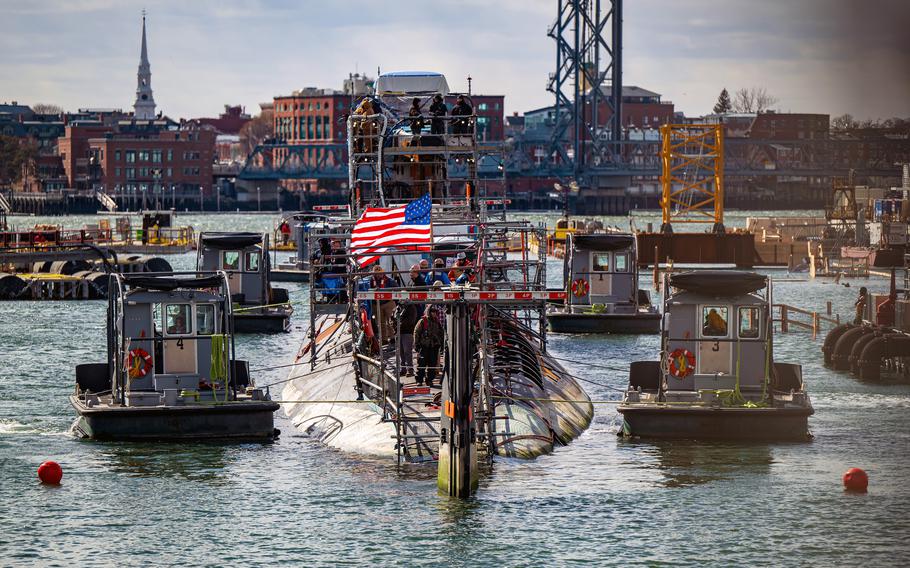
The submarine USS Hampton enters dry dock at Portsmouth Naval Shipyard in Maine on March 8, 2025. (U.S. Navy)
WASHINGTON — Concerns about the impact of mass federal hiring freezes and layoffs on shipbuilding are prompting a group of senators to introduce a bill carving out an exemption for the workforces of the nation’s public shipyards.
The legislation would require the Defense Department to exempt a slew of civilian positions at America’s four public shipyards from job cuts, including welders, engineers, mechanics, painters and blasters, apprentices and roles supporting nuclear maintenance and refueling.
The bill would also remove hiring limits for those positions in an effort to protect shipyard workers from the Trump administration’s moves to cut down the size of the federal government.
“Our shipyard workforce represents an essential component of our national defense and preparedness – they should have never been subjected to this administration’s ill-considered hiring freezes,” Sen. Jeanne Shaheen, D-N.H., said in a statement.
Continuing lawmaker frustration over hiring delays at the Portsmouth Naval Shipyard in Maine prompted the legislation.
The shipyard primarily focuses on overhauling, repairing and modernizing nuclear submarines and has continued to experience issues with hiring despite the Defense Department agreeing to exempt shipyard workers from its civilian hiring freeze, according to lawmakers.
The shipyard needs to hire 550 people per year to keep up with the Navy’s submarine maintenance demands but has been slowed by processing delays at the Office of Personnel Management, the government’s human resources arm, according to Shaheen.
“The Portsmouth Naval Shipyard workforce is supposed to be exempt from the hiring freeze, but there continues to be issues with implementation,” she said. “Our bipartisan bill enshrines that exemption in federal law and ensures that no public shipyard is subjected to such chaos and uncertainty in the future, allowing them to focus instead on the vital role they play in our national security.”
Co-sponsors of the bill include Sens. Susan Collins, R-Maine;, Maggie Hassan, D-N.H.; and Angus King, I-Maine.
The introduction of the legislation is the latest sign of lawmaker discomfort with the scale of civilian workforce reductions and their potential effect on national security.
The Republican-led Senate Appropriations Committee last week approved a defense budget framework with an accompanying report noting the panel’s concerns that civilian job cuts and the slow pace of hiring risks attrition of skilled personnel, particularly in the shipyards.
“The committee expects the [Defense Department] to maintain a stable, effective and appropriately sized civilian workforce and ensure that the hiring process is efficient and responsive to operational and strategic needs,” the panel wrote.
A senior Senate GOP aide speaking on condition of anonymity said senators from both parties have expressed concern about the manner in which workforce reductions have been carried out and were especially worried about the “unintended consequence of losing skilled laborers at shipyards and depots across the country.”
The legislative proposal to protect certain shipyard positions from cuts and hiring freezes comes amid a push by the Trump administration to reinvigorate commercial and military shipbuilding to compete with China’s maritime dominance.
That effort will be complicated by the shipbuilding industry’s long struggle to recruit and retain critical tradespeople such as welders, shipfitters and pipefitters. The jobs often require working in uncomfortable conditions and pay slightly more than retail or fast-food work.
“Our nation’s public shipyards depend on a highly skilled and experienced workforce,” Collins said. “This bipartisan bill would protect the men and women… at all four of our nation’s public shipyards, helping sustain the critical contributions these shipyards make to our national defense, the readiness of our Navy, and the economies of their surrounding regions.”